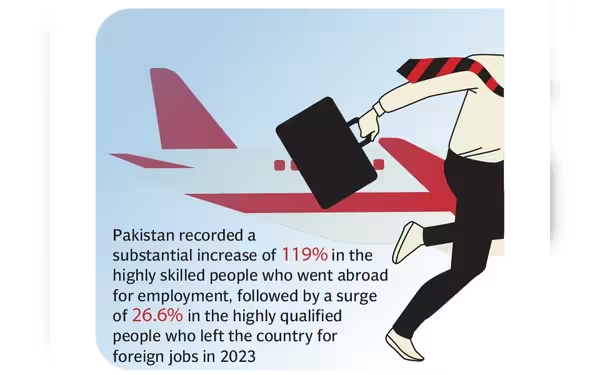Thursday, July 4, 2024 07:10 PM
Pakistan's Brain Drain Crisis: Skilled Workers Fleeing in Droves
- Emigration of highly skilled individuals from Pakistan surges by 119% in 2023
- Factors driving brain drain include lack of job prospects and political instability
- Remittances from overseas Pakistani workers crucial for poverty alleviation and economic stability
 Image Credits: tribune_pk
Image Credits: tribune_pkPakistan faces a significant brain drain crisis as highly skilled individuals are leaving the country in large numbers due to economic hardships, political instability, and lack of job opportunities. The surge in emigration poses challenges for Pakistan's economic and social development, highlighting the need to address root causes and retain talent for sustainable growth.
Pakistan is currently grappling with a concerning trend as the emigration of highly skilled individuals has surged by a staggering 119% in 2023. This increase is attributed to economic hardships, widespread industry closures, and political instability, raising questions about the government's ability to address this issue and secure the nation's future.
The Economic Survey 2023-24 has unveiled a significant rise in the number of highly skilled individuals seeking opportunities abroad, with a notable jump from 20,865 in 2022 to 45,687 in 2023, marking a 119% increase. Moreover, there has been a 26.6% uptick in the departure of highly qualified individuals during the same period.
The primary factors driving this escalating brain drain include a lack of suitable job prospects for skilled workers and the prevailing political and economic uncertainties since late 2021. Nearly half of the industrial units in the country are either partially or fully closed due to financial constraints and inadequate government planning.
Despite relocating overseas, many Pakistani workers continue to support their families back home by sending remittances, underscoring their strong bonds with their homeland. These remittances play a vital role in alleviating poverty, enhancing living standards, and boosting consumption in Pakistan.
As of April 2024, more than 13.53 million Pakistanis have opted for official channels to work in over 50 countries. The Gulf Cooperation Council countries, particularly Saudi Arabia and the United Arab Emirates, host the majority of registered Pakistani workers for overseas employment, significantly contributing to Pakistan's foreign exchange reserves through remittances.
In 2023, the Bureau of Emigration and Overseas Employment (BE&OE) and Overseas Employment Corporation (OEC) registered a total of 862,625 workers for overseas employment, reflecting an overall 4% increase compared to 2022. While the number of skilled workers registered for overseas employment declined, there was a rise in unskilled categories.
The latest available Labour Force Survey (LFS) 2020-21 indicates that Pakistan's total labour force comprises 71.76 million individuals, with an unemployment rate of 6.3%. Youth aged 15-24 face the highest unemployment rate at 11.1%, with females in this age group experiencing a higher rate than males. The employment landscape in Pakistan has evolved over the years, with a shift towards the services sector, which now constitutes 37.2% of employment in 2020-21.
The surge in emigration of highly skilled individuals from Pakistan poses a significant challenge for the country's economic and social development. Addressing the root causes of this brain drain, such as creating more job opportunities, improving political stability, and enhancing industrial growth, is crucial to retaining talent and fostering sustainable growth. Efforts to support skilled workers and provide them with incentives to contribute to Pakistan's progress are essential for building a brighter future for the nation.













